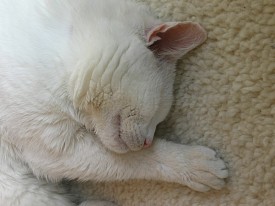White Noise for Reduced Stress and Better Sleep
 Do you ever experience: 1) trouble drifting off to dreamland or staying asleep, 2) an inability to concentrate on studying or writing, or 3) disturbance due to neighbors' late-night partying or garbage trucks rattling by early in the morning? Most everyone does once in a while, and all these seemingly minor problems can have a major effect on our day-to-day functioning and our health.
Do you ever experience: 1) trouble drifting off to dreamland or staying asleep, 2) an inability to concentrate on studying or writing, or 3) disturbance due to neighbors' late-night partying or garbage trucks rattling by early in the morning? Most everyone does once in a while, and all these seemingly minor problems can have a major effect on our day-to-day functioning and our health.
White noise devices offer relief. Find out how using this monotonous type of sound can soothe stress and help even the fussiest insomniac get some much-needed rest.
What is White Noise and How is it Produced?
Technically the term "white noise" refers to sound containing all frequencies at equal intensity, which can only be produced electronically. However, in everyday speech, it's used to describe any type of steady, relatively unchanging background sound.
A plethora of deeply soothing noises are found in nature, such as the repetitive lapping of ocean waves, a gentle rainfall, or the cooing of a dove … as you'll know if you've ever taken a nap on the beach or in the middle of a forest. (Mmm!)
On a more everyday level, folks often find that the sound of an electrical appliance, such as the whir of a fan, air purifier, humidifier, or air conditioner, helps them to relax. This is due not only to its very nature but also to the way this type of whir drowns out disturbing ambient noise nearby -- loud conversation, traffic, construction, and so on. There are also dedicated white noise machines and phone apps to create this soothing effect whenever you choose.
Who Can Benefit from White Noise?
The NIH states that sufficient sleep promotes better learning ability, memory, and mood. Anyone with insomnia or other sleep disturbances may benefit from switching on white noise at night. It's a natural, chemical-free, no-side-effect substitute for sleeping pills, with close to the same effectiveness rate.
White noise will also tend to relax a fretful baby, resulting in less crying and better sleep for both parent and child. It could even result in lowered danger of SIDS from risky behaviors like taking baby into parent's bed or putting him/her to sleep on the tummy or side.
Aside from its value as a sleep aid, white noise can help with work that requires intense concentration -- think writing or studying. What's more, tinnitus sufferers generally experience temporary relief from their condition when they are exposed to white noise.
How to Use an Electrical White Noise Device
Choose a device that offers the type of sound you'll find the most relaxing -- a steady hum or a loop with one of various nature effects (thunderstorm, waterfall, peeping crickets, and so on).
If you would like to block out a specific sound, place the white noise machine between yourself and the source of the sound. For instance, if a television or music played down below is disturbing you, position the device under the bed. Conversely, when you'd like to block out heavy footfalls upstairs, set the unit on a high piece of furniture.
There have been some cases of misuse of white noise devices, especially next to infants' cribs. "The louder the better" is not a philosophy to go by. Fifty decibels is the maximum advisable for a nursery, and 70 is the upper limit for rooms occupied by adults. Adjust the decibel level according to how close the machine will be to the user's ears. Make sure it won't drown out noises you need to hear.
At 38 watts, a typical white noise machine does not draw a lot of electricity. if you'd like to make it even more efficient, some models come with timers, or you can use a general-purpose electrical timer to switch the power off after an interval of 30 minutes or so.
If you don't care for white noise, never fear! You might prefer your background noise pink, gray, blue, or brown. Each type has a different frequency content, which can make it more pleasing to your ears.
Neutral-sounding noise that is used to "cover up" more offensive noise, such as the sounds of a busy street next to your home, is known as sound masking. It's possible to hire an electrician to install a sound masking system for your whole house.
Laura Firszt writes for networx.com.
Updated July 17, 2018.
Looking for a Pro? Call us (866) 441-6648

Electrical Average Costs
Electricians Experiences

Oil Furnace Maintenance Prepares Us For A Cold New England Winter

We Finally Extended Our Concrete Patio And Our Yard Looks Amazing



